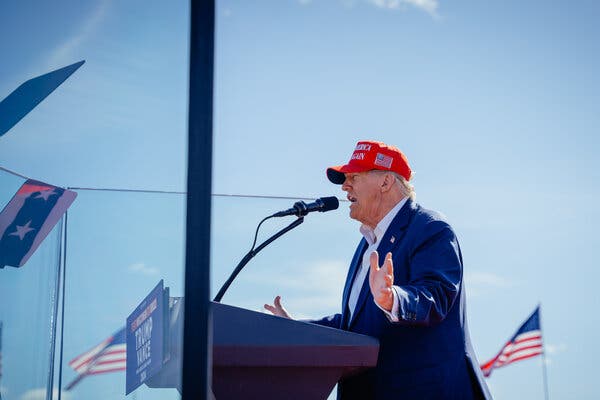Trump Administration Considers Tariffs On Aircraft And Engine Imports

Table of Contents
The Rationale Behind the Proposed Tariffs
The Trump administration's justification for considering tariffs on aircraft and engine imports stems from two primary sources: the ongoing WTO dispute with Airbus and the desire to protect the American aerospace industry, particularly Boeing.
WTO Dispute with Airbus
The core of the issue lies in a long-running World Trade Organization (WTO) dispute between the US and the EU concerning alleged illegal subsidies provided to Airbus. The WTO has repeatedly ruled against the EU, finding that certain government support programs for Airbus constituted prohibited subsidies that harmed Boeing. These rulings have authorized the US to impose retaliatory tariffs.
- WTO Ruling Specifics: The WTO has authorized the US to impose tariffs on billions of dollars worth of EU goods in retaliation for the illegal subsidies provided to Airbus.
- Authorized Retaliatory Tariffs: The authorized tariff amounts have been subject to ongoing revisions and appeals, but the potential for significant tariffs remains.
- Timeline of the Dispute: The dispute has spanned over a decade, involving multiple rulings, appeals, and escalating tensions between the US and the EU.
- EU Countermeasures: If the US imposes tariffs on aircraft and engine imports, the EU is likely to retaliate with its own tariffs on US goods, potentially exacerbating the trade conflict.
Protecting the US Aerospace Industry (Boeing)
A significant argument put forward by proponents of the tariffs is the need to protect Boeing, a cornerstone of the American economy and a global leader in aerospace manufacturing. The argument centers on the idea that unfair competition from Airbus, bolstered by alleged illegal subsidies, undermines Boeing's competitiveness.
- Economic Importance of Boeing: Boeing employs hundreds of thousands of Americans and contributes significantly to the US GDP.
- Jobs at Stake: The imposition of tariffs, or lack thereof, could directly impact the employment landscape within the US aerospace sector.
- Technological Leadership: Protecting Boeing is seen as crucial for maintaining US technological leadership in the aerospace sector.
- Counterarguments: Critics argue that tariffs will harm consumers through higher prices for air travel and ultimately stifle innovation by reducing competition and limiting consumer choice. The potential for higher prices on air travel and air freight directly impacts consumers.
Potential Economic Impacts of the Tariffs
The imposition of tariffs on aircraft and engine imports carries substantial economic consequences, impacting consumers, the global aerospace industry, and international relations.
Impact on Consumers
The most direct impact of tariffs will likely be felt by consumers. Increased tariffs on aircraft and engines will translate into higher prices for air travel.
- Increased Ticket Prices: Airlines will likely pass on the increased costs of aircraft and engines to consumers through higher ticket prices, making air travel more expensive.
- Higher Shipping Costs: Increased costs for air freight will lead to higher prices for goods transported by air, impacting a wide range of consumer products.
- Reduced Air Travel: Higher airfares could potentially reduce demand for air travel, affecting both leisure and business travel.
Impact on the Global Aerospace Industry
The aerospace industry is characterized by highly integrated global supply chains. Tariffs disrupt these established networks, potentially leading to significant disruptions.
- Interconnectedness of the Global Aerospace Industry: Many aircraft parts and engines are manufactured in different countries, meaning tariffs will impact multiple nations.
- Retaliatory Tariffs: The imposition of tariffs by the US is almost certain to trigger retaliatory tariffs from the EU and potentially other countries, escalating the trade conflict.
- Job Losses: The disruptions caused by tariffs could lead to job losses in both the US and other countries involved in the aerospace industry's global supply chain.
Geopolitical Implications
The potential for escalating trade tensions between the US and the EU could have far-reaching geopolitical implications.
- Impact on Other Trade Deals and Alliances: The trade dispute could strain US relations with its allies and partners, impacting other trade agreements and alliances.
- Impact on US Relations with Other Trading Partners: The actions taken in this specific trade dispute set a precedent and could influence other nations' approaches to trade negotiations and disputes.
Alternative Solutions and Future Outlook
While the imposition of tariffs remains a possibility, there are alternative solutions and potential future outcomes to consider.
Negotiated Settlements
The US and the EU could reach a negotiated settlement to avoid escalating the trade conflict.
- Potential Compromises: Both sides could agree on concessions that address the concerns of each party.
- Role of International Bodies: International bodies such as the WTO could play a vital role in mediating the dispute and facilitating a negotiated solution.
Long-Term Implications
Regardless of the immediate outcome, the long-term effects of the tariffs could be significant.
- Shifts in Supply Chains: Companies might relocate manufacturing and assembly to avoid tariffs, causing shifts in global supply chains.
- Increased Protectionist Measures: The dispute could set a precedent for increased protectionist measures globally, potentially hindering international trade and economic growth.
Conclusion
The Trump administration's consideration of tariffs on aircraft and engine imports represents a significant development in the ongoing WTO dispute with the EU and highlights the complexities of global trade. The potential economic and geopolitical implications are substantial, affecting consumers, the aerospace industry, and international relations. The arguments for and against tariffs center on the need to address unfair trade practices versus the potential negative consequences of escalating protectionism. Staying informed about developments in this ongoing dispute is crucial for understanding the potential impact of these aircraft and engine import tariffs on the global economy and the future of international trade relations. Continue to follow updates on this crucial issue to better understand the impact of aircraft and engine import tariffs.

Featured Posts
-
 Cooyah Unveils Grand Slam Track Collection Details On The New Apparel Line
May 11, 2025
Cooyah Unveils Grand Slam Track Collection Details On The New Apparel Line
May 11, 2025 -
 Ultimul Dans Al Lui Thomas Mueller Pe Allianz Arena
May 11, 2025
Ultimul Dans Al Lui Thomas Mueller Pe Allianz Arena
May 11, 2025 -
 Is John Wick 5 A Good Idea Examining The Potential Risks
May 11, 2025
Is John Wick 5 A Good Idea Examining The Potential Risks
May 11, 2025 -
 How Many Fans Will Attend The Bristol Speedway Classic Manfred Waits To See
May 11, 2025
How Many Fans Will Attend The Bristol Speedway Classic Manfred Waits To See
May 11, 2025 -
 Political Fallout Schoof Missing From Debate On Fabers Honours Block
May 11, 2025
Political Fallout Schoof Missing From Debate On Fabers Honours Block
May 11, 2025
